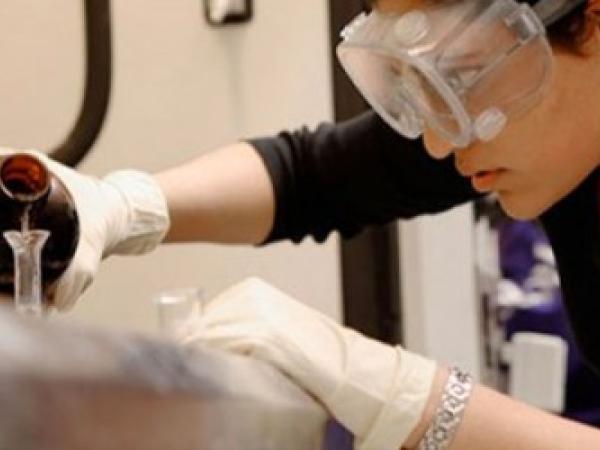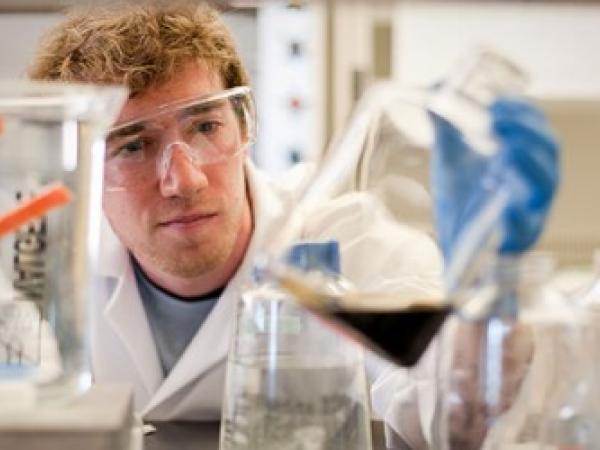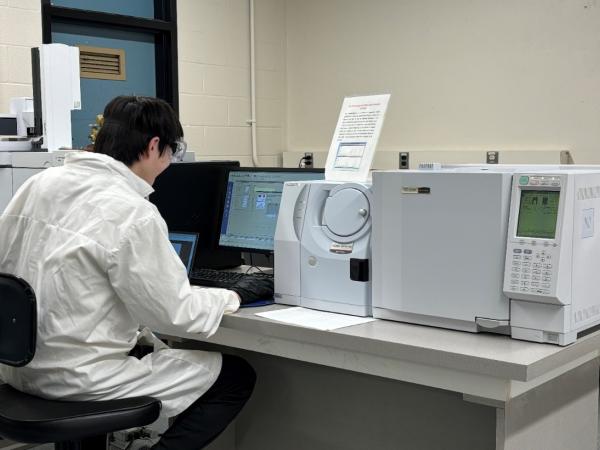The B.S. degree in Chemistry provides students with a broad foundation in Chemistry that prepares them to solve real world problems and for a professional career in Chemistry or a related field.
Program Summary
Our program follows an American Chemical Society accredited curriculum based on a series of basic and advanced theory and laboratory courses with generous free electives that permit students to specialize in particular fields, to explore areas of potential interest, or to take unusual combinations of courses that will suit nontypical career goals. Participation in undergraduate research starting at an early stage is encouraged, and opportunities to improve the written and oral communication skills that are essential for many careers are provided. Three tracks leading to the B.S. in Chemistry are available: a Traditional Track which provides a broad background in Chemistry, a Chemical Biology Track that provides more emphasis on biological applications, and an Industrial Track that includes some basic Chemical Engineering material.
The courses listed in our three tracks to the B.S. represent the course requirements in the typical sequence in which they are taken, but within the limits of course prerequisites timing can be flexible.
Traditional Track
Provides a broad foundation in all areas of Chemistry to prepare students for graduate school, industry, or other careers.
Chemical Biology Track
Intended for students interested in the application of chemistry to biological problems or in careers in the medical field. It provides a sound background in chemistry but also includes a solid core of biology courses so that students completing it will not only have the chemical knowledge to understand the methods they are using, but also will have the knowledge of biology necessary to understand the systems they intend to study.
Industrial Track
Is appropriate for students whose main interest is industry and who would like to have basic knowledge of Chemical Engineering, or who would like to combine a B.S. in Chemistry, with an M.S. in Chemical Engineering.
Environmental Chemistry
Chemists in the environmental field are employed most commonly in industry, government agencies, consulting firms and water treatment facilities. Some courses that are particularly helpful in providing an appropriate background can be found in the Environmental Engineering, Earth and Environmental Science, and Biology departments.
Materials Chemistry
Courses in Material Science and Engineering are useful for students who wish to specialize in the preparation and characterization of solid state materials such as semiconductors and ceramics used in high technology industries, or who are interested in graduate programs in materials science and engineering. Many chemists are employed in these areas. Courses in the structure and properties of ceramics, glass, semiconductors and metals as well as properties of materials are good choices.
Polymer Chemistry
Polymers and plastics are a major area where chemists are employed. Besides the polymer course required in our traditional curriculum, Chemistry special topics courses and courses in the Materials Science and Engineering can provide useful electives while undergraduate research opportunities provide more experience.
Pre-Medical and Pre-Dental Studies
For students who plan to apply to medical or dental school. Chemistry is a good background from which to enter the medical field. The following courses are recommended before the senior year as preparation for the qualifying exams required for admission to medical school: Biol-4270-4280 Human Physiology I and II; Biol-4620 Molecular Biology. Two Communications courses should be included among H&SS options. For more information, see the Pre-Med Program page.
Pre-Law
A degree in chemistry is an excellent preparation for a career in patent law or Environmental law, for which technical knowledge is essential and which includes contact with cutting edge technologies and working closely with scientists. Some courses in Philosophy dealing with logic, ethics and the philosophy of law are helpful, as are courses in communication.
Management
Students can prepare for careers in technologically based industry by combining a chemistry degree with appropriate management courses. Introduction to management, courses on marketing and accounting should be considered.
Chemical Engineering
Chemical engineering is very different from chemistry, but there is much overlap and the ability to understand engineering concepts can be useful in certain industrial positions. Appropriate courses in Chemical Engineering will permit you to bridge the disciplines of chemistry and chemical engineering for industrial employment that requires competence in both fields and allows the option of graduate school in either. Courses in material, energy & entropy balance, fluid mechanics, heat and mass transfer, chemical processes and control, reactor design, and separation methods are particularly useful.
Forensic Science
Forensic science has been defined simply as the application of science to the law. Forensic science is an umbrella term for many distinct disciplines that may be used in a legal investigation. While forensic science is multidisciplinary, most practitioners work in a particular field, and often a particular specialty in that field. A laboratory science is a valuable background and analytical chemistry is particularly appropriate. Some knowledge of biochemistry also is useful – e.g., molecular biology, biochemistry and molecular biology laboratory. Courses in forensic science, evidence handling and related topics could be transferred from other schools.
Pharmacy and Pharmaceutical Science
A licensed pharmacist requires a Doctor of Pharmacy (PharmD) degree. This is a professional degree program which in some schools can be entered directly but in others is entered after a minimum of two years of a regular college science program. A degree in chemistry can lead into programs at this level, or can be a preparation for more advanced Ph.D. level programs in the pharmaceutical sciences involving research. A chemistry B.S. also is preparation for careers in the analytical and manufacturing parts of the pharmaceutical industry. Students interested in this focus area should take elective courses in biology, especially genetics and microbiology including laboratory, human physiology and microbiology.
Cheminformatics
Cheminformatics refers to the use of computational and other data handling techniques to derive relationships from large amounts of chemical data. Its most well-known applications are to determine the relationships between structure and properties of compounds to aid in the discovery and synthesis of new pharmaceuticals, and graduates with knowledge in this area are in demand in the pharmaceutical industry, but it has wider applications. A B.S. in chemistry with an emphasis on elective courses in computer science and bioinformatics provides a background for this field.
Chemistry majors can use the Chemistry electives to fulfill a minor requirement in another department. They can also take a dual major by using the electives in one department to take the required courses in the other. This is difficult with Engineering departments but less so with other Science or H&SS departments. Because a dual major program involves a heavy load of challenging courses, students should not choose this option without careful consideration. In some cases, required courses are sufficiently similar that a particular requirement can be waived with the approval of the Undergraduate Program Coordinator.
Some examples of dual majors include Chemistry and Physics, Chemistry and Biology, Chemistry and Mathematics, Chemistry and Computer Science, Chemistry and Philosophy, and Chemistry and Economics.
Students who successfully complete this program will be able to demonstrate:
- Knowledge of the basic principles of chemistry, including bonding, structure, thermodynamics and kinetics.
- Fundamental knowledge of chemical measurements and data analysis.
- An ability to apply modern chemical techniques and manipulations to practical chemical problems.
- An ability to communicate technical material effectively, using appropriate technical terminology.
- An ability to apply their chemical knowledge to plan, carry out and evaluate the results of a scientifically sound research project.
- Knowledge of standard practices of safety, ethics and professional expectations in the field of chemistry.
Because Chemistry is a fundamental component of many disciplines, and because our free electives permit students in Chemistry to explore other areas, a B.S. in Chemistry gives our majors a wide range of career options.
Academic Opportunities

Student researchers play a critical role in the world-changing discovery, innovation, and breakthroughs taking place across campus.

A society promoting chemical scholarship and collegiality between chemistry students and faculty.

A number of awards are given to outstanding undergraduates to recognize exceptional performance.

The undergraduate laboratory program emphasizes the hands-on use of modern research-grade instruments that allow students to become familiar with real-world equipment and tecniques used in research and industry.
